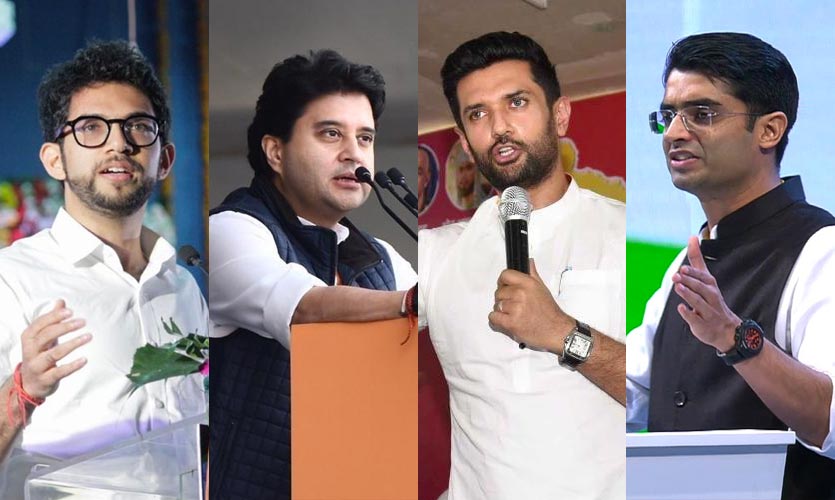Most of the young lot does not seem to be interested in politics. They have distanced themselves from governance, due to which, the system seems to have reached a point of stagnation and been caught in a vicious cycle of gerontocracy – a state or region governed by old people.
More than 65 percent of the Indian population is below 35 years of age. Yet, only 6 percent of India’s leaders are below 35. The average age of an Indian Member of Parliament is 63 years. The age gap between the majority of the population and that of an MP is too much to call India a representative democracy.
Senior Congress leader Shashi Tharoor believes that as a profession, politics has not been very representative of the youth, despite India’s overwhelmingly huge young population base. He says that if this cycle doesn’t break, it could be detrimental to the political environment of the country.
People, on the other hand, are looking for a leader who’s authentic and relatable at the same time, and can bridge the gap between the electors and the elected.
Long Tenures – An Impediment to Youth Participation
We live in a nation where most leaders are already above 60. Keeping the brighter aspect of old-age aside for a moment, impaired decision-making, lack of enthusiasm, rigidity, and willingness to bring change are some common issues that come with the package.
Once the prime of a politician in India is over, a new cycle starts. The word ‘retirement’ does not exist in India’s political dictionary. It’s, in the words of a political analyst, the ‘Duracell syndrome’. Just like the Duracell battery is known for not taking a break, Indian politicians’ tenures also go on and on.
The need for seasoned and experienced political players will always persist as it improves governance, and is undeniably significant. But striking a balance between experienced and fresh candidates can make the system better, eventually nurturing better leaders for tomorrow. Therefore, bringing a constitutional mandate to limit the terms of leaders is necessary to push the youth into mainstream politics.
Will Political Education Solve the Problem?
Fancy speeches. That’s what comes to the mind of young people when they hear the term ‘politics’. “I feel like in Indian politics, they don’t want to bring development. They just want to sit back and enjoy their power,” says a student from Lucknow.
How many young students will show their interest or are willing to talk about politics? Not many. How many will have an opinion on gay marriage, gender inequality, climate change, sexual harassment, and tax reforms? Everyone. The political system encapsulates each one of them. So the question arises: Has the youth really been informed of Indian politics?
The majority of the Indian youth does not hear about the basic political terms till the time they finish higher secondary education, most of whom memorise them for the sake of exams. It would be incorrect to say that young people are disinterested in politics. Perhaps they may be disinterested in what they think politics is. Political education is required to stand up and be able to reason our opinions. It’s crucial for the youth to know that politics is more than fancy speeches. It’s about society, policies, and the frameworks that drive it.
The Way Forward
The current political environment is not exactly welcoming to the youth. “There’s a dire need for change. We need a political party and a system that is spontaneous and is unafraid of taking steps ahead,” says a student from Delhi.
One major problem that is evident in the current scenario is nepotism. If India, by any chance, has seen young leaders, it is only due to the death or health issues of their family members. Climbing the political ladder through mere skill is something that’s still quite uncommon in the country.
Rahul Gandhi, Dushyant Chautala, Jyotiraditya Scindia, Chirag Paswan, and many more, despite the competencies they may have, are still viewed as politicians who’ve got to the positions they hold only because of the support of their strong political families.
Secondly, people entering the game from non-political backgrounds, who have garnered fame in other fields, receive a different kind of criticism. This includes leaders such as Navjot Singh Sidhu and Hema Malini.
India also has leaders who come from student groups and youth wings such as Akhil Bharatiya Vidyarthi Parishad (ABVP), National Students’ Union of India, and Chatra Yuva Sangharsh Samiti. Arun Jaitley, for instance, came from the ABVP background and was an active young politician, who gradually transitioned into the mainstream.
Economic conditions, public perception, and an innate fear that politics is dirty due to politicians’ involvement in crimes, are some common factors that keep youngsters away from it.
Read more: Why Does Political Candidacy Continue To Be A Challenge For Women In India?
Staying away from politics is not an option. As a citizen, you are always connected to it as any events or policies can have a direct or indirect impact on your quality of life. In order to enter the field and grow as a politician, one needs to equip themselves with the relevant skills. Interestingly, you can drive change without entering mainstream politics.
Electioneering, for instance, has become very technical. Digitally savvy people are in need every now and then. Campaign strategists, speechwriters (politicians want to sound perfect as everything is under scrutiny on social media), marketing experts, and many more skillful individuals are required to work within administrations. Passing through the door, exploring, recognising, and gradually improving the framework of the Indian system is a necessity that the youth can fulfil.
To be able to bring real change, the youth will need to be a part of the political machinery responsible for making such changes. If not the youth, then who? If not now, when?










